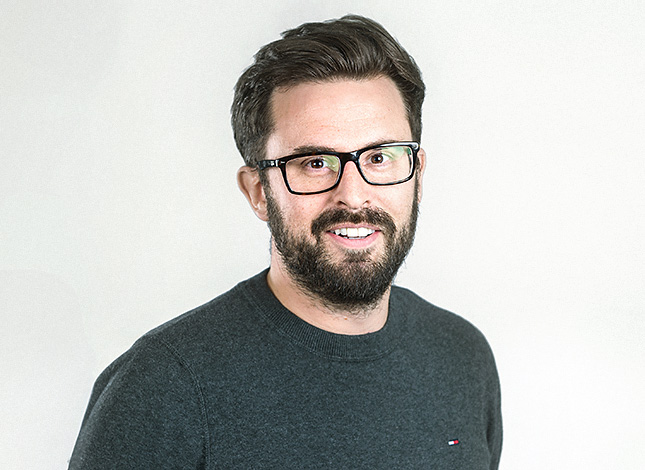Rob Smith works as Digital Director at Blueleaf Digital. When not indulging his secret fast car fetish he can be found posting articles on his website. Follow Rob on Twitter.
The Day Job
Tell me a little bit about the company you work for
Blueleaf Digital is a digital agency helping clients with their digital presence and marketing. Exactly what that means is different things to different people. We help some clients with their e-commerce websites, some with their e-mail marketing, some with improving conversions rates, and much more – if it’s digital, we can help.
What is the ratio of digital project managers to production staff at your company?
1 to 4
Do you use any particular project management methodologies? If so, why? If not, why?
No, unless we’re using them without knowing. Web project management is generally, in my opinion, good common sense and excellent communication. Having said that I’ve never tried any of the methodologies available so I could be wrong. I do believe though that Digital Project Managers all have their own style, and that can vary wildly depending on them, and the client. I’m not sure one methodology fits all combinations.
What online or offline tools do you tend to use for digital project management?
E-mail, phone, Excel, Word etc. For sitemaps and wireframes we’re constantly trying new tools as we’re not settled on one that seems to work great. Have tried Word, OmniGraffle, MockingBird (pretty good), Balsamiq and a load of others I don’t remember. Have also used Merlin for Gantt charts (before realising they are the bane of my life), use Sifter for bug tracking and have also using Basecamp on some projects to organise files.
The answer to this one is also it depends I’m afraid. Some clients have no idea about using tools like Basecamp to collaboratively work over the web, and as such the good old office apps come out to run the project more than maybe they should. You could argue that we should educate the client in the new way of thinking, but to be honest, educating five decision makers at a traditional company to login / create their account and start exchanging information in one place is pretty hard.
Plus they end up sending everything in an e-mail anyway with the question “Do I need to add that to the whatsamyjig thing?”. A good Digital Project Manager knows their audience, and works with them for the bets possible solution.
Rant over. Sorry.
How on earth did you end up managing digital projects? Few people start out with this aim. Tell me how you wound up being a full-time punch bag?
I’m not strictly a full time punch bag, more of a part-time bunch bag and coach. As a director at BLD I also go out and do a fair bit of selling (rescue my soul) as well as sorting out your general day-to-day business needs.
I ended up here mainly due to being a techie first building sites since I was around 14 and slowly doing more and more on the business side to end up where I am.
Looking at this now it actually gives me a three sided perspective of techie, sales and digital project management which gives a pretty rounded approach.
Do you just manage digital projects or is your role varied? If so, what other roles do you perform?
Oops, jumped the gun… I sell a fair bit, going to initial chemistry meetings and writing a lot of the proposals that go out of the door and so on. That probably takes up to 40% of my time overall, but varies week to week.
The other 60% of the time is split between internal business work (writing articles for PR, sales meetings, targets, appraisals etc.) and digital project management work (speaking to clients, organising priorities, checking that in with production, monitoring progress etc.)
What type of digital projects do you typically work on?
A wild variety. I tend to look after the bigger clients from a digital perspective like Laura Ashley and Ena Shaw (who we run a site for Next, BHS, Debenhams and others) as well as Big Yellow Self Storage.
So this varies from large e-commerce applications (building, launching, updating and enhancing) to segmentation and campaign planning for e-mail marketing to standard website builds (content managed sites to drive credibility / enquires)
How many digital projects are you currently managing? What’s the most you’ve ever managed at any one time?
Depends on projects vs accounts.
With Laura Ashley and Ena Shaw for example, we will have 3-5 projects going on at any one time. Some in the formative stages, some in full swing and some being rounded off. But that’s just two accounts.
I would say right now there are probably around 15 projects I’m juggling and very different stages of life, which is pretty much a normal number. Any more that that and things start to get missed and lost. It might sound like a lot but some are very small and need little attention and fly in and out with relative ease, while some need more concentration.
What percentage of a digital project’s total budgeted hours would you typically spend on project management?
Snuck this question in didn’t you? One of the biggest questions of internal debate we have at BLD. This might sound remotely insane, but as a director I don’t track my project management hours. I’ll track any hours that are specifically doing something (wireframing or sitemapping for instance) but not for calls or planning. I know that sounds crazy. But for the number of things I do each day, I would spend an hour logging the time – it’s admin overload.
Our other Digital Project Managers do log their time though, and pretty religiously at that. Web project management is probably the biggest factor in whether we go over on budgeted hours for a project. It is, in our experience, one the hardest to quantify factors before starting a project. Some clients need a lot, some are pretty easy. It’s not reflection on them as a company or individual – some just need more than others.
So having pre-framed all of that am I going to answer the question? I don’t know. In sales, we don’t put a line in there for digital project management, we’ve found it makes a project harder to sell as clients do not understand why they should pay for digital project management, I mean surely you have to do that to have a project so why should I pay for it? At least that’s a client’s general response we have found. If I was on the other side of the fence I may agree. So generally, we build that cost into the others areas of the quote as you would expect.
So let’s answer the question. 10-20% depending on the project.
What digital projects are you working on right now, and what digital project are you most proud of to date?
Currently e-commerce at Laura Ashley, Ena Shaw (e-commerce, conversion, e-mail marketing), Big Yellow (segmentation and targeting, e-mail marketing), and Ovo energy (customer login portal to manage their account) are the main ones. There’s a few other credibility check / enquiry generator websites I’m also working on or helping other Digital Project Managers with.
As the Digital Director I like to oversee all digital projects and generally do the requirements gathering for every project and try to also do the Information Architecture (IA) for it too. But then for day-to-day running, another Digital Project Manager handles that (copy, imagery, deadlines etc).
Most proud of is Laura Ashley – it’s now won two awards (Fresh and DADI) and has produced some truly superb results for them.
Describe a typical day in the life of your role managing digital projects.
Morning, get into work (8:30) with a bread baton and bottle of water (weird breakfast granted but it seems to work). Generally a coffee appears usually via very helpful Digital Project Manager Sarah or would probably die of lack of caffeine.
Check e-mail, check task list for day, see whether anything new needs to be added to the task list and do so if needed. Reply to all e-mail I can at that point.
Pick up first task on the list and begin working on it. This will generally involve going downstairs to talk to production and about where something’s up to, what’s just come up or how I can help in anyway to sort something out. If it doesn’t involve that, I’ll probably don the headphones and get stuck in to writing a new proposal, responding to a change request or some other such document that requires my attention.
Note: The previous paragraph may well be replaced by a meeting of some kind in which case that will probably add rather than take away tasks!
Lunch will role around which consists of bombing round to the Co-op to grab a sandwich and coming back and eating it while catching up on industry news, blogs and opinions.
Afternoon generally mirrors morning before bugging out around half 5 / 6.
Evenings, some will involve a networking event or round table or other such thing.
How would you describe your managerial style?
Chaotic? I am not really cut from a typically Digital Project Manager mould. In that I mean I don’t have a reputation for detailed working or incredible organisation (unlike Sarah mentioned above). In any case everything seems to work and flow pretty well and clients are very happy, sometimes internally we are like the duck idly gliding on the water with the legs going like stink underneath.
That is why however other Digital Project Managers and the production team support to ensure that everything works well.
What are the common things that crop up on a daily basis that destroy your planned activities for that day?
Normally, clients throwing a spanner in the works. Not in a bad way, just that’s what clients do. The worst is the “I know you didn’t know about this but can we do this by the end of today?” – as much as we want to help clients that request is the spanner in the works. As an agency though it’s your job to cope with that.
Second common thing is probably dealing with multiple decision makers at a company. In theory, a company should organise their decision makers and come to some kind of conclusion before letting us know their consolidated thoughts. In practice this is rarer than it should be and so we need to try and play peacemaker and go between. Again, part of being an agency.
How do you keep organised personally, given the hectic life that comes with managing digital projects?
Actually, this is one of the hardest parts of being a Digital Project Manager. I have tried Outlook to do lists, e-mail flags, iPhone to do lists syncing with the Mac and paper based systems.
The system that seems to be working for me right now is Tracks from MyGTDify as recommended by your good self.
What needs to be combined with this is an almost fascist approach to e-mail. What I mean by this is that if you read an e-mail you either: don’t need to do anything at all, reply to it immediately, reply to it immediately and add a task to your list. There is no such thing as reading an e-mail, and then ‘saving it for later’ or ‘I’ll do it later’. You read it 4-5 times before you action it – pointless! But what about the e-mail where you need someone else to help? That’s the reply to it immediately and add a task to your list – if you client has a response, they have closed the loop and know you’re on it.
Never leave an e-mail unresponded to!
This of course needs to be combined with the ability not to check e-mail every minute of the day – if you do, you’ll lose time quicker than a goldfish loses it’s memory.
The Projects
At what point do you typically get involved with a digital project you are to manage? Pre-sales and estimating or only post-sale?
All the way through end to end.
What technique do you use to estimate digital projects? Do you use different ones for small and large projects?
Normally it works on a time basis. How many hours will this take? We all talk together to decide a figure. Generally we then build in PM hours on top and finally add what has sometimes been referred to as ‘ball-ache factor‘. This is a combination of:
- Have we done this kind of project before / worked with this kind of tech before?
- Has the client ever done a project like this before?
- Are all the decision makers in one place / easy to communicate with?
- Are there other parties involved that we need to collaborate with?
This seems like a pretty formalised process but it’s not – they are just guidelines to be aware of when coming up with a price. We believe it’s essential that you factor in things like the above – not every project is the same, not every client is the same. You need to flex your pricing as a result.
Bigger projects are similar; however we generally undertake a smaller project first, which is scoping exercise. This a paid for exploration of the project in it’s finer detail to be able to decide a more accurate price.
How do you handle unrealistic digital project budgets and schedules?
Honesty. We just tell the client that from us anyway, we cannot accomplish that project with those resources (money or time). Generally we try to explore why a project is so urgent or budget strapped, and explore whether there’s something we can do instead that will produce the same effect.
How does your company approach scheduling all the work currently in the pipeline?
Constant communication of priorities and how much work is involved at each stage. We generally have a record of all deadlines on display, and plan work two weeks ahead (current week and next week). We’ve found any further forwards and too much changes for the plan of work to be useful – clients miss copy deadlines, other projects take a bit longer, etc. It all seems to work out well.
You receive a new digital project to manage, what are the first steps you’ll take?
Check everything received is realistic (time and money mainly), who the decision makers are etc. Just an overall reality check – then onto planning.
Do you manage all aspects of digital projects, like design, front-end and back-end development, or do department leads manage production based on requirements you capture?
Overall, everything. Once the planning has been finished though, the production leads (studio manager and lead developer) will lead when the design and development work gets done within specified constraints.
What deliverables do you personally typically produce on a digital project? Sitemaps, wireframes, functional specifications? Or are these produced by someone else? If so, who?
Everything in planning, so all you described above. Then it’s into production. Generally I also do the training on the resulting systems we put in place.
What are all the things that will be defined and approved before design or development begins on one of your digital projects?
Deliverables, timescales and budget.
How do you tackle the art of monitoring digital project budgets versus progress?
Questions:
- Are we on track to the timescales?
- Are we on track versus hours budgeted?
- Is the client happy?
Simple questions. And then if no ‘What can we do about it?’
How do you manage the inevitable scope creep on digital projects?
By changing attitude to scope creep – it’s such a horrible term. It implies that what’s happening is bad and unnecessary. Sometimes a change to the plan (which is all it is) is good and necessary.
So to manage it: cheerfully, with acceptance and challenge. Is it needed?, why do you need it?, could it be in phase 2? Does this have an effect on other elements of the project? Are you prepared for the fact that this will make the budget X and the timescales Y?
It’s all just communication of the implications of change. If the client and ALL decision makers accept this, we are happy for the change to take place.
There is a line of course. There’s a point where we have to make it very clear that if they want the project to see the light of day, they need to draw a line where no changes take place, allowing a successful launch.
What advice would you give for managing difficult clients?
Listen, a lot more than you want to. The easiest way to diffuse an angry or difficult client is to hear them out completely. Let them say their piece without saying anything apart from confirmations you have heard. When you think they are about to finish, wait, because there will be some more. Once they have got everything off their chest, only then can you speak. First reiterate what they have said as you understand it and check they agree you understand.
Then finally start to offer up possibilities of solutions. This method means the client feels like they have been completely understood, and clears the air. You may need to this several times! Never try to offer solutions first and never be confrontational. It’s all about communication.
Most ‘difficult clients’ aren’t – you just need to communicate with them on their terms. Again, there’s a line. Some clients are better off just agreeing it’s not working and moving on.
How do you ensure past mistakes on digital projects never happen again?
By remembering what went wrong and why. Did we need extra budget? Do we need to ask XYZ question much earlier? Always do a post diagnosis on a digital project, even if it’s just with yourself or in your head. There’s always lessons to be learnt from success and failure.
The Big Questions
What websites, blogs and podcasts are you currently using regularly for inspiration?
Boagworld, Sam Barnes project management blog, Signal vs Noise, Occam’s Razor, NMA, Future Now’s GrokDotCom, Bryan Eisenberg, A List Apart, Smashing Mag – there’s a stack more of them to be honest there’s a lot of good stuff out there.
What are the biggest differences between managing website projects and web application projects?
Websites have to deal with a lot of content of different shapes and sizes and have that flexibility. Web applications on the other hand generally have quite discrete pieces of information that need to be filled in and in that way are slightly more constrained – that’s about all though.
What do you think are the key personality attributes required to be a good digital project manager?
Great communicator, good team worker and a juggler.
What are the biggest common misconceptions about digital project management?
That it’s easy and just how much time it really takes.
What, in your opinion, is the hardest part of digital project management?
Saying no.
In three words, how would you describe digital project management?
Key to success.






Leave a Comment